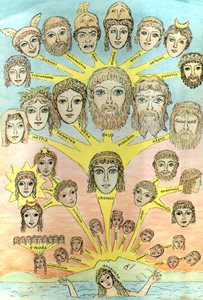Playing is Learning
The Greek Gods
June 17th, 2015
| Ads | ||
|
Play the Challenge
|
||
|
A New Word is Coined A new Character is revealed A new Game is Afoot |
An Edutainment Adventure Based on Three Rounds of Investigations
|
|
|
Welcome to the World of PROFESsee™by seeCOSM™ PROFESsee™ is my title. I am the perpetual learner, in pursuit of knowledge, wisdom and truth. I derived my name from professor |
 |
|
|
In Greek mythology, Homer is the origin of all gods. Have you noticed that Greek gods had the best sounding names? They could also marry. For example, Hebe, the goddess of youth, left her place after marrying Heracles. In the depiction of the gods in art, they are shown as very beautiful, very well structured… But they had their bad side too, and you didn’t want to be in their path of wrath when they were coming from Olympus for revenge. The Greek family tree is ambiguous and many sources are inconsistent. As a result, many of the Greek gods are said to come from conflicting genealogies. For example, the Greek god Aphrodite is sometimes said to be the child of Zeus and Dionne and sometimes to be born of the sea. Clymene is another confusing example often explained away as having six parents which seems improbable. As a result, Greek mythology is hard to understand for many. No pun intended, but spirituality does seem to bring in more confusion than understanding. Therefore, we can hardly blame the conflicting sources of family trees of the Greek gods. To cite just one example, there is this family tree of Greek gods on Wikipedia. It starts with the chaos/void, the abyss and the earth follow in quick succession. Athena, Artemis, Apollo, Aphrodite and Dionysius come way down the family tree. Don’t worry, we told you it’s complicated, no? Some trees are less complicated though, but then you can look at as many as possible. Thousands of years ago, people in ancient Greece believed in a family of gods that was said to live on top of mount Olympus. From this tallest of all the Mountains, the gods were said to look down upon the rest of the world. The gods were especially interested in the lives of humans. However, the gods did not just watch but they also acted. Sometimes when a certain ruler neglected to pay homage to them, a Greek god would come down from their high perch and punish the ruler. The Greek gods did not however just punish the wicked; they also helped the righteous perform their righteous duties. Because of all the interactions with gods, the people of ancient Greece came to accept the gods as part of their everyday life. Today, all that remains of these beliefs are the stories that make up the bulk of Greek mythology. There are stories of fearsome monsters that would turn people to slabs of stones simply by looking at them. There are also other stories of giants would slice open the sky to let down rain. These stories of the gods however, are more than just entertainment. It is really hard to write about gods and religion without stepping on some toes. However, readers have developed some thick skins and therefore it does not hurt them. Thus in some places, just like any other religion, you will find information to the effect that the ancient Greeks didn’t like to live with mysteries and so they came up with stories to try and explain everything around them. Can you Assemble the Greek gods' family tree? Image courtesy of: http://happytrailswildtales.com/2011/07/greek-mythology-greek-god-family-tree-mythological-maps/ |
||
Latest News / Events
E-mail [email protected]
The Professee™ Newsletter Beta
http://www.seecosm.com/
http://www.seecosm.com/

